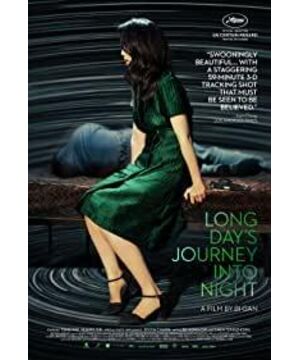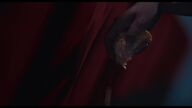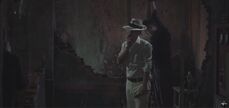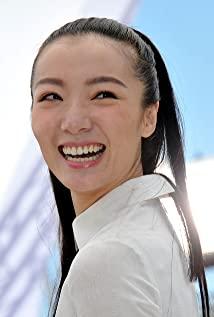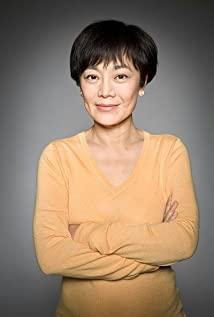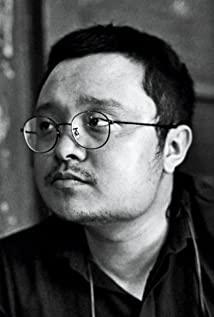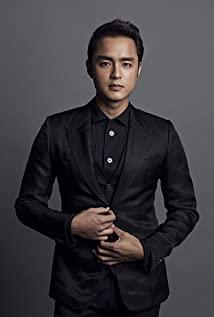1.
"The Last Night of the Earth" reached one third of the time, and director Bi Gan arranged for Huang Jue to sit in front of the window on the second floor. Through the window, we saw a train passing by on the extended railroad track, which was difficult to distinguish from the end to the end. The camera pans to the right, and in the glass box placed next to Huang Jue, there is a slowly wriggling snake. When he got up and left, the camera flickered, and the train had been swapped from end to end, and it drove back the same way.
In the alchemy of ancient Egypt, a pattern of ouroboros representing infinite cycles was once derived. A snake bites its own tail and devours itself, while destroying itself, it also gives itself new life. Derived from it, the symbol "∞" representing infinity, has an inherent equivalent relationship with the Möbius ring in topology. The same train appeared twice in the shot, and it traveled back and forth with its head and tail interchanged. Together with the snake in the glass box, it just formed the endless looping meaning of the ouroboros symbol. It implies that the Mobius ring structure in the film not only stays at the narrative level, but also penetrates into the inner emotional entanglement of the characters.
When the character in the film develops his own emotional trajectory along any point on the abstract Mobius ring, he can return to the back of the starting point without any special changes. Unique nature). Therefore, he constantly examines the same time and space from a new perspective and obtains a new feeling of heterogeneity and homogeneity, so the cycle continues. This is the core space-time movement structure of "The Last Night on Earth".
2.
In Kaili twelve years ago, Luo Hongwu’s friend, the white cat, was killed by the triad boss Zuo Hongyuan, but Luo fell in love with his lover Wan Qiwen, and shot Zuo Hongyuan and went away. ; Twelve years later, Luo, who was already gray-haired, returned to Kaili to look for Wan Qiwen's traces, pieced together her past experiences in the descriptions of different people, and gradually mixed the images of her and her mother, Xiaofeng; just want to see Before arriving at Wan Qiwen, he entered the dream world on the screen in the movie theater, connecting the past, present and future together, and met Kaizhen (exactly the same as Wan Qiwen), and finally relived the moment when his mother eloped and left.
The story of "Earth" itself is not complicated. What makes viewers constantly confused is actually the drift of the character's identity deliberately set. Bi Gan meticulously designed various types of details to imply the identity relationship between different characters: for example, the watch worn by Tang Wei connects Wan Qiwen, Kaizhen and Xiaofeng (Luo Hongwu's mother); Dang Xiaofeng When they coincided with the appearance of the white cat’s mother, Luo Hongwu and the white cat’s established an equivalent identity relationship; at the same time, the eagle pattern that appeared on the white cat’s chest and the eagle tattoo and the white cat’s table tennis racket referred to the identity of the two. She converges; when the little white cat told Luo Hongwu that he was twelve years old, we immediately remembered that Wan Qiwen had confided to Luo Hongwu that she was pregnant with the latter's child twelve years ago. Green papers, table tennis games, apples, houses, spells, dyed red hair, even prison wire fences, small town iron gates, and white cat mother barbershop floor tiles all show the same hexagonal honeycomb pattern... all of them The details have set up many puzzles for the identity relationship of the characters, making them sometimes mother and son, sometimes father and son, sometimes lover, and sometimes friend.
In the various identity references and evolutions that have gradually become crazy through time and space, we have gradually realized that it is almost an impossible task to clean up the relationship between characters with conventional linear logic. As the creator, Bi Gan enjoys and intends to appear on the screen, it is the mysterious flowing state produced by the constant drift of identity. Whenever we pay attention to it and begin to analyze and think about it, the meaning of the character's identity is lost as the details unfold. Any attempt to clarify the relationship between the characters and the plot logic at the plot level can only lead to a misunderstanding of the film's intention.
Behind such a magical screen Schrödinger's state, what we can finally feel is the infatuation between a symbol that encompasses all male identities and another that aggregates all female identities. In Bi Gan's emotional universe, whether it is a father, a son or a friend, what they are obsessed with and looking for is a kind of eager anticipation of the unknown, and what they feel is always the unsolvable regret after the loss. The sustenance and projection object of this dual emotion are all condensed in an Oedipus complex mother/lover hybrid in "Earth".
3.
In that long shot that looked like a tunnel through time and space, Luo Hongwu, in a state of fantasy, witnessed his mother Xiaofeng and the beekeeper elope away from home. But instead of stopping his mother, he took part in it, forcing the beekeeper to open the iron gate with a pistol, and let the latter take her away and fly high.
In this imaginary space, due to the prompting role of the prop watch (Xiaofeng left the watch to Luo Hongwu before leaving, and Luo gave it to Kaizhen at the end of the film, but Luo and Wan Qiwen twelve years ago When we met, it was worn on the latter's wrist again), we realized that in Bi Gan's identity metaphor universe, these three people actually pointed to the same identity. Especially when the beekeeper and Xiaofeng ran away, they drove the small truck left by Luo Hongwu's father. We finally understood the connection between Luo and the beekeeper from the above detailed clues: they shared together A common reference that is almost equivalent in an identity.
As a result, a typical Oedipus desire model appears in the entanglement of the dual emotional desires of son/mother and man/woman: On the surface, Luo cried because of the departure of his mother, but in fact it was exactly Another "self" separated from his body took Xiaofeng away. It is precisely because of Luo’s emotional consciousness that he allows Xiaofeng to transform from a "mother" to a "woman", that is why he forces his "son" identity to give way to his own "man" identity, and let the latter eventually "Get" the woman. When he turned around to eat an apple and cried (the intention of "apple", because he mentioned the details of "mother sad to eat apple" before, and it became a symbol of "lost mother"), what he sorrows is not his mother's separation. To go, but as a son's overlapping fantasy of the "mother/woman" dual desire identity that Xiaofeng cherished, because Xiaofeng finally transformed into a "woman" and died forever.
Here, Bi Gan arouses a kind of entanglement that is difficult for ordinary people to grasp. It is the paradox of "permanent loss" in the way of "acquisition", that is, the loss of "Oedipusian Oedipus fantasy expectation" while satisfying the desire for "woman", which constitutes the core pain of "Earth" : Luo Hongwu destroyed his dual identity intention of "mother/woman" in the way of Oedipus, and because he couldn't go back to the original to experience the fantasy of "mother/woman", he didn't want to live.
It is precisely because of this that he split himself crazily into several different identities, embarking on the path of time and space in the Moebius ring that has no cause and no effect, no origin and no end, and he continues to return with various identities. Go to the same time and try to find the object of desire that can arouse his strong emotional hormones in the first place. Just as at the end of the film, he returned to the revolving room, where he hugged and kissed Kaizhen (another embodiment of his mother/lover), in order to look back at the inexplicable and complicated emotional expectations for the future, and the flashing fireworks reminded This is another brief and vain disillusionment for him.
We can also dig deeper into the core theme of the film: perhaps "Oedipus" is also a superficial sustenance. What really makes Bi Gan obsessively express is that in the regret of permanently losing the obsessed object, he repeatedly appreciates the existence of his own spirit. "Battered" pleasure. This is the powerful inner driving force that allows him to use such brain power, energy and financial resources to build up this illusion with a baroque gorgeous hierarchical structure.
4.
An interesting detail is that Bi Gan has always hinted at its lie in the surface text of "Earth".
Those puzzling identities drifting and splitting and the details leading to the logical relationship between the contradictory plots were each presented as a fait accompli from the beginning. Those narratives about character relationships and action motives lead the audience to fall into traps, losing the basis for judging truth and falsity. In this regard, Bi Gan made a dodging defense through Luo Hongwu's mouth in the film: "Memory cannot tell the truth from the false, and it will appear in front of you at any time." What he conceals here is the false proposition of "memory is true and false" Sex-memory is always forced to be faithful to the consciousness of the memorizer. It may produce errors and breaks, but it cannot actively create falsehoods. When a person starts to make statements that are inconsistent with his own memory, he opens up a state of active fiction, just like Luo Hongwu's description of the white cat (that is, to himself) in the film: he always lies.
"Lying" comes from the subjective initiative of people. It can borrow the shell of memory or dreams (but not really related to them in essence) as an account of false facts, causality and character identities, in order to "mislead" the audience. The "excuses" for attention, and foreshadowing the subsequent subversive "betrayal" of them. The seemingly ambiguous state of "Earth" full of dreamlike suspense and temptation comes from such a "cheating" type of vain shot. Behind the uncertain facts and the crazy drift of the identity of the characters, contrary to the seemingly ethereal so-called dreams, what Bi Gan wants to express is a conclusive yearning for the aforementioned state of emotional obsession. In fact, it is neither confused nor illusory, and there is no inner contradiction of self-doubt. What is surging under the surface of the illusion is an extreme trust and fascination with personal emotions.
Therefore, the discussion of "Earth" can break away from the category of specific film forms and methods, and evolve into an issue of emotional aesthetics value ethics.
5.
Tarkovsky, whom Bi Gan admired, portrayed a mother with rich and delicate emotion and sculptural beauty in "Mirror". Its greatness comes from the director's sincere admiration and appreciation for motherhood, and its sadness comes from the memory of the disappearance of beauty and the noble recognition of its spiritual value.
In "Earth", when we push through the fog of identity change and the artificially disrupted time course, we throw away the impact on Patrick Modiano, Eugene O’Neill, Roberto Polano and Tarkov. The craftsmanship of "Forced Quotation" by Skye is finally exposed to the nervous distress caused by the inability to permanently obtain the desire and emotion symbolized by the mother/lover. It renders the regret of loss, the loss that cannot be possessed, the emptiness anxiety of not being able to find a lost property, and the mystery of self-emotional value arising from this inversely. When a film is extremely concerned about expressing the desire for something as its own and the pain that cannot be obtained, even if the value of the object is portrayed as expensive and rare, its realm cannot match the spiritual value of beauty in "Mirror" Faith and compassion are on the same level.
Because the same identity drift and fission technique is used to describe the retrospective experience, many people regard "The Last Night on Earth" as an upgraded version of "Roadside Picnic". It is also true that, under the background of sophisticated and complicated technical methods that have reached the peak, "Earth" has greatly enriched and perfected the external expressive intention of "Roadside Picnic" in terms of form. But if "Roadside Picnic" still carries a trace of doubt, judgment, and confusion about the uncertainty of the emotion itself, then "Earth" has slipped into the self-compassionate self-confidence of the "dictator" with perceptual and arbitrary colors. . Just like the wolf dog raised by the innkeeper in the film, emotions come immediately after being recruited, and its direction obeys the extreme will of the owner. Especially when we heard that the boss named it "Kai Li" (the director’s hometown and the place where the story of the two films took place), we were more interested in the special subconscious emotion expressed in "The Last Night on Earth". One more perceptual cognition.
View more about Long Day's Journey Into Night reviews


